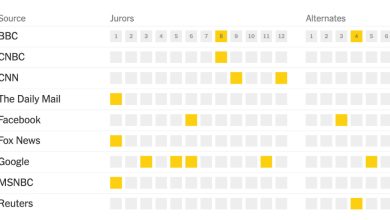Vangelis, Composer Best Known for ‘Chariots of Fire,’ Dies at 79

Vangelis, the Greek film composer and synthesizer virtuoso whose soaring music for “Chariots of Fire,” the 1981 movie about two British runners in the 1924 Summer Olympics in Paris, won the Academy Award for best original score, died on Tuesday in Paris. He was 79.
The cause was heart failure, said Lefteris Zermas, a frequent collaborator.
A self-taught musician, Vangelis (pronounced vang-GHELL-iss), who was born Evangelos Odysseas Papathanassiou, recorded solo albums and wrote music for television and for films including “Blade Runner” (1982), “Missing” (1982) and “1492: Conquest of Paradise” (1992). But he remains best known for scoring “Chariots of Fire.”
The most familiar part of that score — modern electronic music composed for a period film — was heard during the opening credits: a blend of acoustic piano and synthesizer that provided lush, pulsating accompaniment to the sight of about two dozen young men running in slow motion on a nearly empty beach, mud splattering their white shirts and shorts, pain and exhilaration creasing their faces.
Vangelis’s music became as popular as the film itself, directed by Hugh Hudson, which won four Oscars, including best picture.
The opening song, also called “Chariots of Fire,” was released as a single and spent 28 weeks on the Billboard Hot 100 chart, including a week at No. 1. The soundtrack album remained on the Billboard 200 chart for 30 weeks and spent four weeks in the top spot.
Vangelis said the score immediately came to him as he watched the film in partly edited form.
“I try to put myself in the situation and feel it,” he told The Washington Post in 1981. “I’m a runner at the time, or in the stadium, or alone in the dressing room … and then I compose … and the moment is fruitful and honest, I think.”
He was working at the time in his London studio with a Yamaha CS-80 synthesizer.
“It’s the most important synthesizer in my career and the best analog synthesizer design there has ever been,” he told Prog, an alternative music website, in 2016, adding, “It’s the only synthesizer I could describe as being a real instrument.”
For “Blade Runner,” a science-fiction film noir set in a futuristic Los Angeles, Vangelis created a score to match the director Ridley Scott’s dystopian vision. He augmented the CS-80 synthesizer, which produced the sounds of horns and bass, with an electric piano and a second synthesizer that emulated strings.
“What interested me the most for this film was the atmosphere and the general feeling, rather than the distinct themes,” he said on a fan site, Nemo Studios, named for the studio in London that he built and for many years worked out of. “The visual atmosphere of the film is unique, and it is that I tried to enhance as much as I could.”
The “Blade Runner” soundtrack album was not released until 1994, but it was well received. Zac Johnson of Allmusic wrote that “the listener can almost hear the indifferent winds blowing through the neon and metal landscapes of Los Angeles in 2019.”
Vangelis was born on March 29, 1943, in Agria, Greece, and grew up in Athens. He started playing piano at 4 and gave his first public performance two years later. He did not have much training and never learned to read music.
“Music goes through me,” he told The Associated Press in 1982. “It’s not by me.”
In the 1960s, he played organ with the Forminx, a Greek rock band. He left Greece for Paris in 1967 after the military coup there.
Vangelis was a founder of Aphrodite’s Child, a progressive rock band that had hit singles in Europe and enjoyed some success on FM radio in the United States. The band released a few albums, including “666,” which was inspired by the Book of Revelations. When Aphrodite’s Child broke up, he moved to London in 1974.
In the 1970s he began composing music for television shows like the French documentary series “L’Apocalypse des Animaux” (1973), as well as working on solo albums and film projects. Music from his album “China” was used by Mr. Scott in the memorable 1979 “Share the Fantasy” commercial for Chanel No. 5.
He also became friendly with Jon Anderson, the lead vocalist of the British prog-rock band Yes. Vangelis was invited to replace the keyboardist Rick Wakeman when he left the band, but he turned down the offer. He and Mr. Anderson subsequently collaborated, as Jon and Vangelis, on four albums, including “The Friends of Mr. Cairo,” between 1980 and 1991.
Vangelis’s music was also heard on the scientist Carl Sagan’s 1980 TV series, “Cosmos.”
Information on survivors was not immediately available.
Among the films Vangelis scored after “Chariots of Fire” were “Antarctica” (1983), a Japanese movie about scientists on an expedition; “The Bounty” (1984), with Anthony Hopkins and Mel Gibson; Oliver Stone’s “Alexander” (2004), about the Macedonian king; and “El Greco” (2007), a Greek film about the artist.
He also composed music for spectacles like the 2000 and 2004 Olympics and the 2002 World Cup. And in 2001 he recorded a choral symphony, “Mythodea,” which he had adapted from earlier work, at the Temple of Zeus in Athens to commemorate NASA’s Odyssey mission to Mars.
“I made up the name Mythodea from the words myth and ode,” Vangelis said in an interview for NASA’s website in 2001. “And I felt in it a kind of shared or common path with NASA’s current exploration of the planet. Whatever we use as a key — music, mythology, science, mathematics, astronomy — we are all working to decode the mystery of creation, searching for our deepest roots.”




